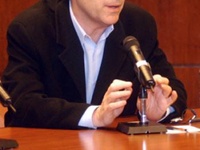Thernstrom, who supports the war, says history is full of examples of international organizations that have failed to respond effectively to military crises, such as the League of Nations and the Triple Alliance that failed to contain Hitler.
And some who support the war argue that it will in fact bolster the international reputation of the U.S.
Ford Foundation Professor of Science and International Affairs Ashton B. Carter, a former assistant secretary of defense for international security policy, says the country will be “vindicated when we are able to hold up and show the chemical and biological arsenal that is the cause of this war.”
He adds that the moment is right for the U.S. to assume its responsibility as a world leader.
“It will not be seen that we did it without the U.N. Security Council, but that the Security Council did not have the fortitude and appreciation to see it done,” he says.
“The world desperately needs a policeman and we are its only candidate,” Thernstrom adds.
Ignatieff, who says he supports the war “with his heart in his mouth,” says no one nation is entirely to blame for the current crisis, pointing to the fact that had France not vowed to veto any use of force, the U.S. would have had more alternatives.
“This has been the worst display of international leadership in my lifetime,” he says.
Dictating Democracy
Just as many professors disagree over the precedent this war will set, so too do they argue over the feasibility of one of its primary aims—establishing democracy in the Middle East.
Even those who think it is possible question whether it is the U.S.’s prerogative to carry it out.
Kafadar, who says he would have supported a U.N.-sanctioned war, says that military intervention, not Iraqi self-determination, is the only means to abolish Saddam’s regime.
“Self-determination of people sounds good, but you rarely find one people ruling over one place,” he says. “The principle in itself does not explain such complicated pictures.”
But Assistant Professor of Government and Middle East specialist Eva Bellin says that it is absurd to think that U.S. intervention can install democracy in a region of the world where it has never existed and where anti-American sentiment is rising by the hour.
“You can’t dictate democracy from the outside,” she says. “[It] defies political science.”
Read more in News
Top Israeli Official Talks Policy













